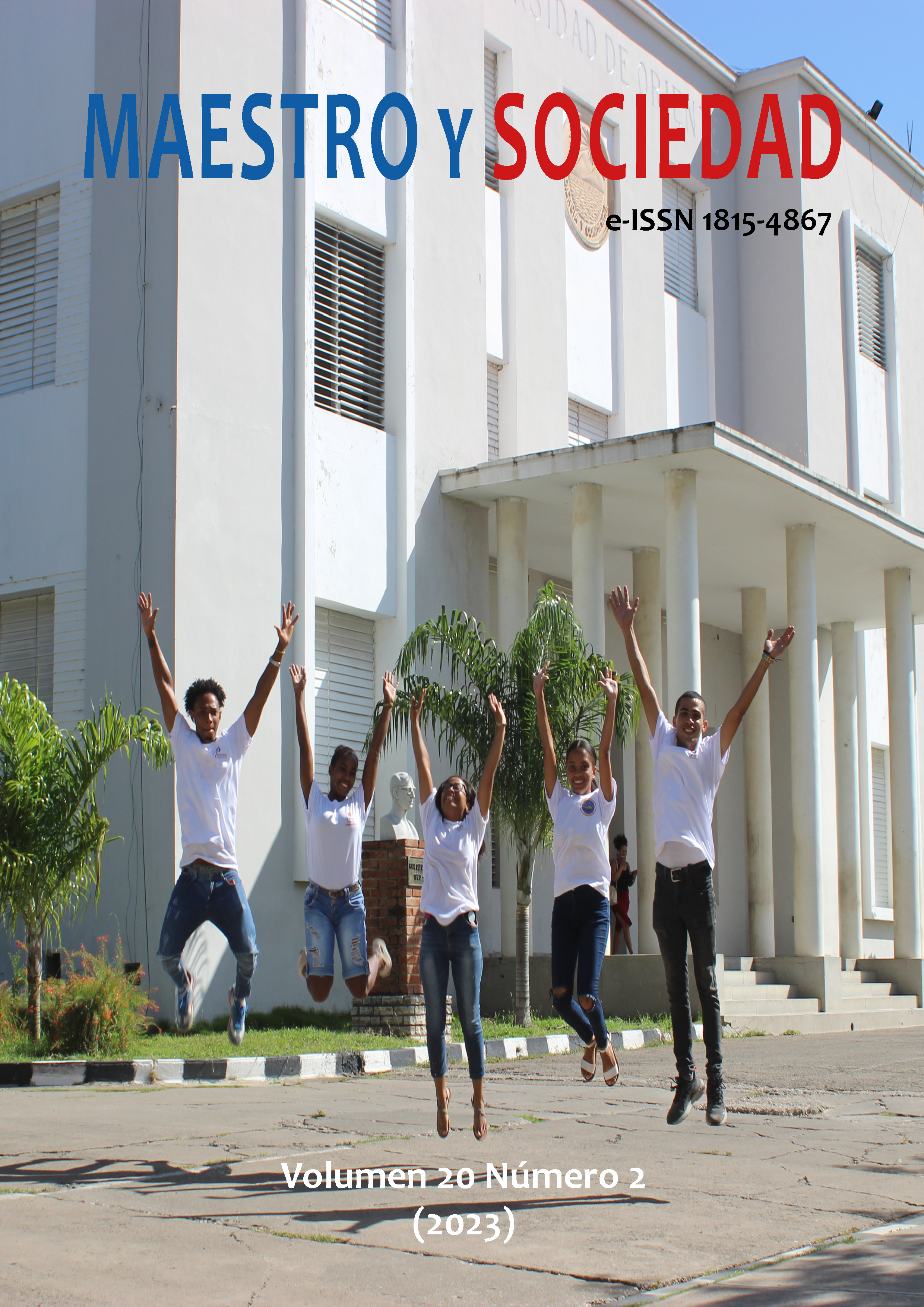The educator's of the first childhood preparation in the formation professional ludic
The educator's of the first childhood preparation in the formation professional ludic
Keywords:
formation; educator; ludic-professional; methodologyAbstract
Introduction: The current progress of society imposes, more and more, to attend the development of the teaching-learning process in the upper secondary education of the early childhood educator for the playful in correspondence with the Profile of the Graduate and the III Improvement of the System National of Education. That is why the objective of this work focuses on the development of a methodology for the recreational-professional training of the student in the early childhood educator specialty, which contributes to raising its quality in the pedagogical schools of the Santiago de Chile province. Cuba. Materials and methods: In this process, action research, participant observation and discussion groups were used, through the use of theoretical, empirical and statistical-mathematical methods that revealed the existence of pedagogical and didactic deficiencies that must be resolved for the achievement of a graduate with a comprehensive and comprehensive training. Results: From the previous considerations, a cognitive apparatus is offered from the proposed methodology, containing theoretical, practical and instrumental foundations, which from its relationships emerges a method with its procedures, which leads to a ludic-professional training logic of the students in the early childhood educator specialty. Discussion: In correspondence with the demands of society based on the purpose of education for this educational level, which is to achieve the maximum possible integral development of each girl and boy from birth to six years of age. Conclusions: The above has allowed to consolidate the impact of the knowledge created and its implementation in the different educational contexts of this level of education in the province, in correspondence with the transformations that are operated in the Pedagogical Schools, by showing the elevation of the indicators of efficiency and quality in them, which contributes to increasing the quality of the training process.
References
Alberto B., A. (2022). La orientación lúdica para el trabajo en el programa “Educa a tu Hijo”. http://portal.amelica.org/ameli/journal/429/4293350006/
Chapa, P., & Martínez, T. D. (2016). La importancia de la actualización de conocimientos como parte de la formación del docente universitario. Revista Iberoamericana de Producción Académica y Gestión Educativa, 1-20. https://www.pag.org.mx/index.php/PA G/article/viewFile/420/459
Díaz, J. (2011). El juego como estrategia educativa en la formación de adultos. https://javierdisan.com/2011/09/01/el-juego-como-estrategia-educativa-en-la-formacion-de-adultos
Escalona, I. C. (2020) Estrategia de formación lúdica para estudiantes que cursan la especialidad de la primera infancia. (s.e.).
Estrada, A. (2020). El juego y la lúdica como estrategias didácticas en los procesos de formación profesional de los alumnos normalistas. https://revistadecooperacion.com
Farias, D., & Rojas, F. (2010). Estrategias lúdicas para la enseñanza de la matemática en estudiantes que inician estudios superiores. Paradigma, 31(2). http://www.scielo.org.ve/scielo.php?script=sci_arttext&pid=S1011-2512010000200005
García, M. (2018). La formación inicial del estudiante de la Licenciatura en Educación. Preescolar para la orientación educativa. [Tesis de doctorado. Universidad de Oriente].
Sagarra-Téllez, M. B., Escalona-Vázquez, I. de la C., & Peña-García, A. (2021). Compromiso social de justicia y equidad de los educadores de la primera infancia. [Ponencia. Congreso Internacional Pedagogía 2021].
Sagarra-Téllez, M. B., Escalona-Vázquez, I. de la C., & Peña-García, A. (2022). 11. La formación lúdico-profesional de los estudiantes en la especialidad educadores de la primera infancia. EduSol, 136–150. http://edusol.cug.co.cu/index.php/EduSol/article/view/376/1100
Sierra, R. Y. (2013). Propuesta lúdica componente de la formación integral de los Estudiantes de primer semestre en pedagogía infantil y Especial fundación universitaria los libertadores. [Tesis de maestría].
Yagüé Hurtado, M. (2018). El método lúdico para la formación de valores ético-cívicos en básica secundaria. Revista Conrado, 14(65), 106-111. http://conrado.ucf.edu.cu/index.php/conrado
Downloads
Published
How to Cite
Issue
Section
License
Copyright (c) 2023 Mayra Bárbara Sagarra Téllez, Irelis de la Caridad Escalona Vázquez, Alina Peña García, Alexis Céspedes Quiala

This work is licensed under a Creative Commons Attribution-NonCommercial-NoDerivatives 4.0 International License.
This journal provides immediate open access to its content, based on the principle that offering the public free access to research helps a greater global exchange of knowledge. Each author is responsible for the content of each of their articles.



























 Universidad de Oriente
Universidad de Oriente 